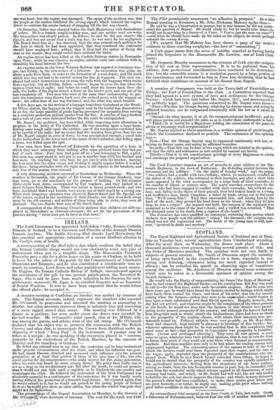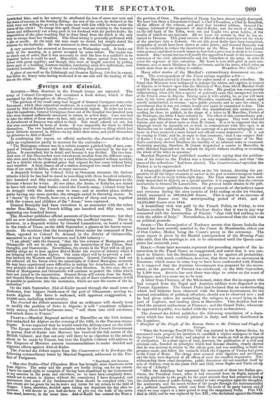SCOTLAND.
The Royal Highland and Agricultural Society of Scotland met at Dum- fries on Tuesday last; several agriculturists from Cumberland attending. After the usual show, on Wednesday, the dinner took place. About a thousand gentlemen were present, including several persons of title; and the Duke of Montrose presided. The speeches were not very fertile in subjects of general interest. Mr. Smith of Deanston urged the necessity of being open-handed in the expenditure on a farm, especially in ma- nuring and draining,—cheapness heing too much regarded instead of efficacy: but he curtailed his speech on observing signs of impatience among the audience. Mr. Aitchison of Menzion uttered some sentiments which may be taken as a favourable specimen of opinion among the Scotch farmers— He would take the liberty of congratulating his Grace [the Duke of Montrose] that he had crossed the Highland border—as his countryman Rob Roy was wont to call it—for the first time, under such favourable auspices. Had he come here three years ago, he would have found the farmers excited by feelings which might have made them remind his Grace, and those of his order, that the day seemed coming when the farmers—unless they were to be superseded—would require to lean upon a more substantial reed than liberal speeches. Happily, however, that day had not arrived; and whatever might be the complaints:of the wheat-growers in the South, he would not deny that the farmers in this district were partici- pating in the general prosperity of the country; and although the harvest bad not been altogether such as would satisfy the husbandman, there had been no check to the prosperity of the trading classes, with whom their interests were per- manently bound up. Political subjects were very properly, as Mr. Hope John- stone had observed, kept entirely in abeyance in meetings of this society; but, whatever opinions there might be, he was satisfied that to this complexion they must come at last—that prosperity in Lancashire was prosperity in Damfries- shire. (Great and prolonged cheering ) They were all now agreed, or must come to agree, whatever were their political opinions, that it was in vain for them to fatten their stock if they could not send them when fattened to remunerating markets. And these markets were only to be had where the trading classes were congregated together. The consuming-power of the masses to take of the food which the farmers could send them depended upon their wages; and the rate of the wages, again, depended upon the prosperity of the manufacturers who em- ployed them. While he as a Scotch farmer conceded these things, he hoped it would not be denied that the prosperity of the country was equally indebted to the agricultural interests; flowing from the abundance of our home produce, arising, no doubt, from the late favourable seasons in part, but, he contended, still more from the wonderful stride which science applied to all departments of rural economy had made, and which, as Mr. Smith had well said, has not only tended to fertilize the soil, but also to improve the climate; and where, in many instances, the patriot's claim had been established, to make three grains grow where only one grew formerly,—or rather, he might say, making gram grow where nothing grew before available to the interests of man.
An extraordinary trial occurred at the Jury Court, in Tain, last week. Grant, a fisherman of Portmahomack, believed that the wife of another fisherman had
bewitched him; and to her sorcery he attributed the loss of some new nets and his want of success in the herring-fishing: the rest of the crew, he declared at the trial, were not willing to go out in the same boat with him while he was under the curse of the witch! To escape this spell, Grant went one evening to the woman's house and deliberately cut a deep gash in her forehead with his pocket-knife; the superstition of the place teaching that to draw blood from the witch is the only way, to escape from her thraldom. This blood-letting isgenerally performed with a pin or needle. At the trial, the man made no denial, but simply stated the reasons for his barbarity. He was sentenced to three months' imprisonment.
A very extensive fire occurred at Inverness on Wednesday week. It broke out early in the morning, in a garret occupied by some tailors. The engine was so much out of order, that it was necessary to send the hose to a saddler's to be repaired before it could be used. Meanwhile, the flames spread from house to house with great rapidity ; and though they were at length arrested by pulling down part of a building, fourteen families, numbering sixty-five individuals, were rendered houseless. Many of them lost everything they possessed.
A piece of sea-wall on the Edinburgh and Greaten Railway, 150 feet in extent, has fallen in; heavy rains having weakened it on one side and the beating of the sea on the other.



























 Previous page
Previous page